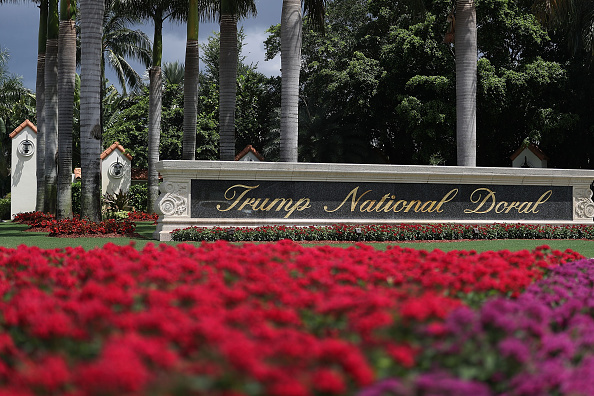The Trump National Doral resort in Miami — one of the gaudiest jewels in the president’s golf-centered business crown — has lost much of its glitter in recent years.
And Trump himself — his name, his behavior, his “brand” — seems at least partly to blame.
The sprawling, 800-acre resort, with nearly 650 hotel rooms, is in “sharp decline,” reports the Washington Post quoting a tax consultant for the Trump Organization as saying it is “severely underperforming” other resorts in the Miami area.
The Doral opened in 1962 and thrived for decades, a magnet for wealthy celebrities and star golfers. But it was in bankruptcy when Trump bought it for $150 million in 2012 and spent $250 million more on extensive renovations, all financed by a loan from Germany’s Deutsche Bank.
Trump has listed the Doral “as his biggest moneymaker hotel,” says the Post. But late last year, tax consultant Jessica Vachiratevanurak told a Miami-Dade County official that “room rates, banquets, golf and overall revenue were all down since 2015” and that “the resort’s net operating income … had fallen by 69 percent” in two years.
The reason, she said, is “negative connotation that is associated with the [Trump] brand.”
The Post says it’s “the first known case in which a Trump Organization representative has publicly acknowledged the president’s name has hurt business,” and suggests “the Trump Organization’s problems are bigger than previously known.”
After reviewing data about the Doral’s finances that Trump had to provide Miami-Dade County, an analyst hired by the Post declared that “profitability is down across the board,” although the resort remains profitable, “in part because it has reduced expenses.”
Doral’s decline “is especially significant because the resort had seemed better insulated from political backlash than other Trump properties, protected by its place in golf’s history, by its recent renovations, and by its location in a booming state that Trump won in 2016.”
Turns out, it wasn’t.
The Doral is managed by the president’s son, Eric, who calls the Post story “completely senseless,” adding that “Our iconic properties are the best in the world and our portfolio is unrivaled by anyone.”
The Trump Organization sought to explain the declines at Doral in a statement to the Post “that implicitly contradicted its own tax consultant and blamed factors that had nothing to do with Trump’s name,” including fears of the Zika virus and hurricanes in 2016 and 2017, that reduced tourism in South Florida.
But statistics provided to the county by Trump’s own company “showed competing resorts in the same region of Florida still outperformed the Trump resort in the key metrics of room occupancy and average room rate.”
Some other Trump properties, including office buildings he partly owns in New York and San Francisco, continue to yield tens of millions in profits for the president, but they do not bear his name.
But revenues from other properties, including hotels in Chicago and New York, fell after Trump entered the presidential race in 2015.
“What began with the Macy’s department store chain dropping Trump-branded neckties during the campaign and New York City building owners stripping his name from their properties has led to a shrinking of Trump’s customer base among a wide swath of businesses, charities, wealthy travelers and golfers to a more narrow pool of clients who are aligned with his politics,” says the Post.



